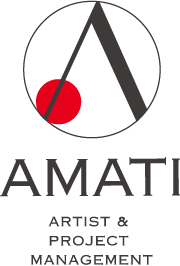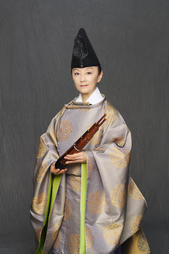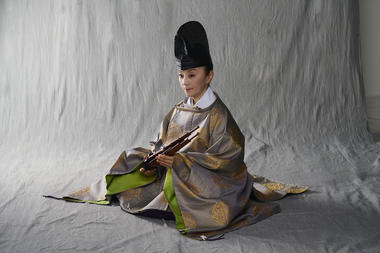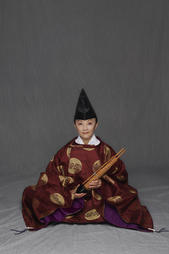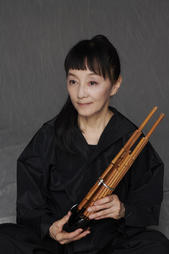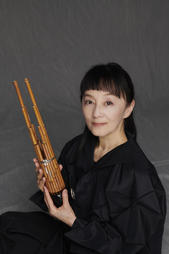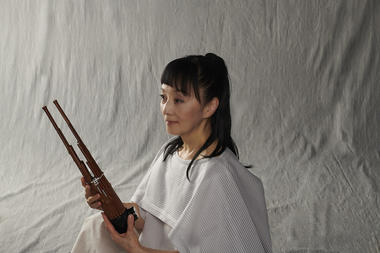Mayumi MIYATA
SHO
Profile
Mayumi Miyata is distinguished by being one of the first artists to bring the traditional Oriental instrument the SHO, to worldwide recognition. Through her virtuoso performances around the world, Ms. Miyata's artistry has helped expand awareness of the SHO both in Japan and overseas and she can be credited with making it widely recognized not only as a traditional instrument but one that has a valid place in contemporary music.
Having graduated from Kunitachi College of Music in piano, Ms. Miyata studied 'Gagaku', (Ancient Japanese Court Music), and in 1979 joined the Gagaku ensemble at the National Theater of Japan. Since her debut Tokyo recital in 1983, she has been active as a soloist and stunned audiences with her performances in Paris, Amsterdam, New York, Seattle and Milan (La Scala), Vienna (Konzerthaus) and at festivals such as Salzburg, Luzern, Rheingau, Schleswig-Holstein, Avignon, Tanglewood, London Proms, Milano Musica, Festival d'Automne a Paris, Donaueschinger Musiktage, Wien Modern, Octobre en Normandie, Darmstadt International Summer Course, Festival Extasis (Geneva), Musica Viva (Munich), Musik Aktive (Dortmund), Orleans International Music Week, Pacific Music Festival Sapporo, Takefu International Music Festial and Akiyoshidai International Contemporary Music Festival.
Although the SHO has its origins in Gagaku, and it is this music with which it is traditionally associated, Mayumi Miyata is highly acclaimed for her performances of compositions by many of the world's leading contemporary composers. She has worked particularly closely with John Cage, having performed the world premiere of all of Cage's Two3 for SHO and Conch in Italy in 1992, and is also associated with composers such as Toru Takemitsu, Toshio Hosokawa, Helmut Lachenmann, Paul Méfano, Klaus Huber, Pierre-Yves Artaud, Zsigmond Szathmáry, Toshi Ichiyanagi, Maki Ishii, and Joji Yuasa, having been invited to premiere many of their works. Such highlights include major works such as Takemitsu's evocative "Ceremonial -An Autumn Ode-" with Seiji Ozawa and the Saito Kinen Orchestra and Hosokawa's "Utsurohi Nagi" performed with the WDR Symphony Orchestra, Cologne in 1996 and Hosokawa's "Could and Light" with Deutsche Radio Philharmonie Saarbrücken Kaiserslautern in 2008. In 1997 Ms. Miyata participated in the tremendously successful world premiere in Hamburg of Lachenmann's major operatic work "The Little Match Girl", which was followed by performances at Staatstheater Stuttgart, Opera de Paris, Deutsche Oper Berlin and Ruhr Triennale. In 2007 Ms. Miyata has premiered Gerhard Stabler's new work for SHO and Orchestra in Duisburg.
Furthermore her recent orchestra engagements include BBC Symphony Orchestra with Kazushi Ono, Orchestre Symphonique de la Monnaie with Kazushi Ono, NHK Symphony Orchestra with Charles Dutoit for their European tour in St. Petersburg, Moscow, Vienna, Munich and Berlin, New York Philharmonic with André Previn, PMF International Orchestra with PMF International Orchestra, Tanglewood Festival Orchestra with Seiji Ozawa, Czech Philharmonic Orchestra with Vladimir Ashkenazy, Bamberger Symphoniker with Jonathan Nott, Orchestre National de Lyon with Jun Maerkl, Munich Chamber Orchestra with Alexander Liebreich.
Highlights of Ms. Miyata's career include such diverse engagements as her performance of the Japanese National Anthem at the Opening Ceremony of the Nagano Winter Olympic Games and her work with Björk on the soundtrack to Matthew Barney's film Drawing restraint 9, in which she appears playing her instrument.
She was nominated as cultural ambassador by the Japanese Agency for Cultural Affairs and as such toured Europe giving concerts, workshops and collaborating with local artists and composers, promoting knowledge of the SHO overseas.
